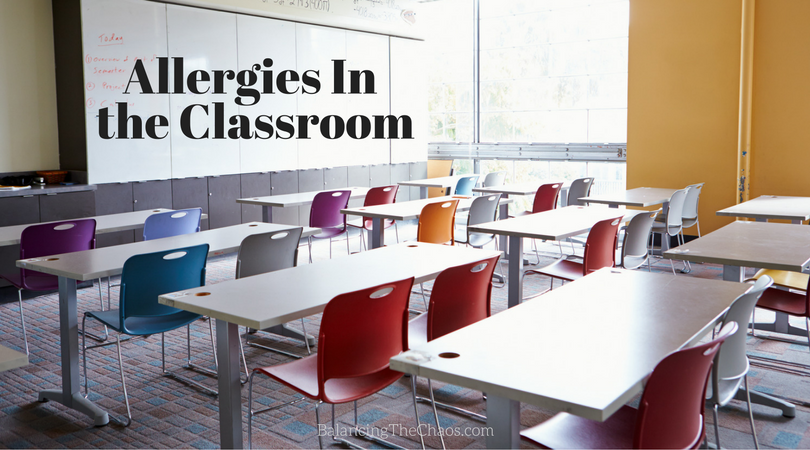
It seems as though in every other classroom, there is a child with a severe food allergy. These allergies have the potential to result in an anaphylactic reaction, a dangerous situation. Because of this, my children’s school has adopted the policy that classroom celebrations occur, WITHOUT treats provided by parents. I admit, I was one of those parents who was initially upset that I was no longer able to bring cupcakes to school to celebrate my child’s birthday, until I realized how deadly an allergic reaction can be.

I had the opportunity to speak with Dr. Yana Samarasena, an Asthma and Allergy Specialist at Kaiser Permanente. She shared that one in twenty-five children have some sort of food allergy. The most common allergies are milk, eggs, peanuts and tree nut allergies. Dr. Samarasena has a child with food allergies, so she knows firsthand what it is like to be a parent dealing with these issues.
I myself, suffer from seasonal allergies, and when I have a bad flare up, at times, it can be hard to breathe. If I’m in a room where cat hair and dander exists, I begin to feel the effects. With an allergic reaction to cats, I suffer from watery, itchy eyes, sneezing, and eventually I feel my throat begin to swell, making it difficult to breathe. A quick walk outside typically relieves some of the symptoms, other times it’s a dose of allergy medication that does the trick.
Food allergies are not something to take lightly. It is a medical disease that can be life threatening within seconds. During an allergic reaction or an anaphylactic reaction, the immune system reacts to a specific protein in the food you are allergic to. This reaction triggers allergy cells to release chemicals, including histamines that causes itching and swelling. In some instances, the swelling can occur in areas that cause difficulty breathing.
Dr. Samarasena shared some key tips when it comes to dealing with allergies at school:
- No food sharing – We teach our children that sharing and getting along is important. However, when it comes to food and allergies, it is vital that we tell our children not to share food when at school.
- Allergy Zone – Many schools have adopted the “allergy table”, a clean area where children who have severe food allergies are able to eat. Sitting at the “allergy table” reduces the child’s exposure to foods that they may be allergic to that are in their classmate’s lunches.
- Hand washing before and after eating – Washing hands before and after eating will diminish the chances of passing on food allergens to those who are susceptible. Food residue on a child’s hands could pass on food allergens, so keeping hands clean will help to prevent transmission of allergens.

I personally have never had to use an EpiPen. This injection administers epinephrine, a chemical that narrows blood vessels to combat low blood pressure and opens airways to reduce breathing difficulties. Most schools are required to have a food allergy/anaphylaxis plan as well as a prescription for Epi-Pen provided by the parents already in place in case of emergencies. If a child is unaware that they are having an allergic reaction, these are some of the symptoms that the child might describe when an EpiPen may be necessary:
It feels like something is poking my tongue
- My mouth is tingling
- My tongue feels like there is hair on it
- My tongue is itchy, burning
- My ears feel itchy
- It feels like there is something crawling in my ear.
- My throat feels funny
If the child describes a combination of two or more of these symptoms or is having problems breathing, the EpiPen is needed to stop the reaction. Administer the EpiPen and call 911, then contact the child’s parents.
Dr. Samarasena also stated that there are groups of children that are at a higher risk for severe reactions:
- Adolescents and young adults
- Children who have a prior history of anaphylaxis
- Children with asthma – especially if asthma is poorly controlled
- Children with a known food allergy.
Bakeries and restaurants are taking action and providing allergy free menu options, since it is harder to distinguish ingredients. Per Dr. Samarasena, one bakery she has recently discovered is “Sensitive Sweets” in Fountain Valley which provides allergy free menu options. If you know of any other establishments, please comment and share.
Open enrollment is coming soon! In choosing Kaiser Permanente Orange County, you’ll have the ability to select from many services such as: primary and urgent care, emergency facilities, labor and delivery, pharmacy, and lab all housed under one roof. The ability to choose your own doctor based on their specialty is an added bonus. Find out more today at: kp.org/orangecounty. Connect with Kaiser Permanente via social media, visit Facebook or Twitter.




